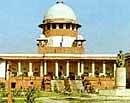
The verdict, which upheld the constitutional validity of courts’ powers in this regard, however, observed that directing the CBI to proceed with investigations should be exercised cautiously and sparingly.
The unanimous verdict of a five-judge Constitution Bench headed by Chief Justice K G Balakrishnan came with strict guidelines. The Bench, also comprising Justices R V Raveendran, D K Jain, P Sathasivam and J M Panchal, said the power should be used “in exceptional and extraordinary circumstances in cases having national and international ramifications”. Otherwise, the CBI will be flooded with such directions in routine cases, the Bench observed.
Sounding a word of caution for the higher judiciary, the Bench said before ordering a probe the courts “must satisfy themselves of the need for the probe to uphold fundamental rights and the dignity of the rule of law”.
Asserting the power of the higher judiciary, the judges said: “Such powers are vested with the apex court and high courts to ensure protection of fundamental rights of citizens under Article 21 of the Constitution”.
The verdict came on a bunch of petitions by the West Bengal government and some others who contended that the CBI can conduct a probe in any state only with prior consent of the government concerned under the provisions of the Delhi Special Police Establishment Act.
The Bench had reserved its verdict on the issue of the higher judiciary's power on December 11, 2009 after hearing arguments from various sides. The question of whether higher courts are empowered to order a CBI probe was referred to the Constitution Bench by erstwhile Justice B N Agrawal on March 22, 2007.
Justice Agrawal had referred the question while dealing with an appeal by the West Bengal government against a Calcutta High Court ruling of April 7, 2001.
The high court had ordered a CBI probe into the alleged killing of 11 Trinamool Congress workers in Midnapore. The state government had contended that if courts order a CBI probe, it would amount to a violation of the Delhi Special Police Establishment Act.
Section 6 of the Act provide that the CBI cannot investigate a cognisable offence without the prior consent of the state concerned, the government had said.
The state government contended before the Supreme Court that neither the high court nor the apex court have the power to order a CBI probe into allegations of scandals or on any other issue.
It also submitted that the power to order a CBI probe was solely vested with respective state governments and even the Central government had no power to order a probe unless the state concerned consented. The Centre, however, argued that there was no restriction on the courts to order a CBI probe into sensitive cases with national and international ramifications.